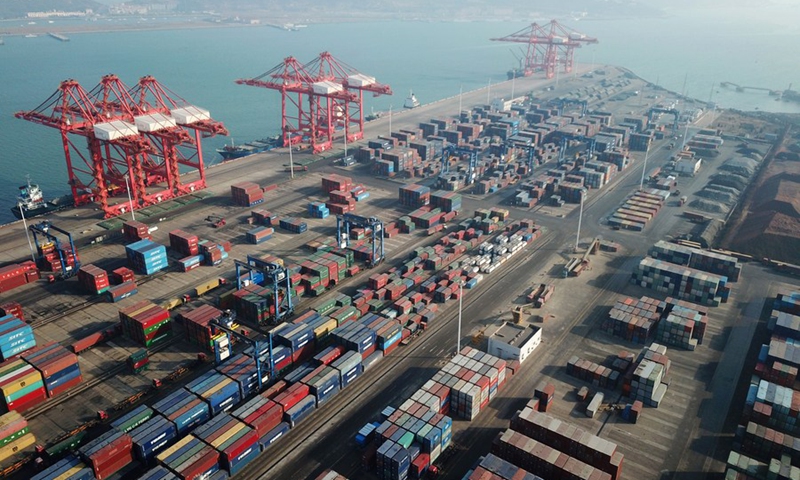
Aerial photo taken on Jan. 14, 2021 shows the container terminal of the Lianyungang Port in Lianyungang City, east China's Jiangsu Province.(Photo: Xinhua)
The US trade office has announced plans to reinstate tariff exemptions on some Chinese products on which Washington first imposed levies in 2018. The move proved that trade war launched by the US has not achieved its intended effect and further exposed its deep reliance on Chinese commodities to ease inflation, experts pointed out.
The US Trade Representative's office said on Wednesday it has reinstated 352 expired product exclusions from US "Section 301" tariffs on Chinese imports. The exclusion will be effective retroactively from October 12, 2021 and extend through December 31, 2022.
The 352 products include industrial components such as pumps and electric motors, certain car parts and chemicals, backpacks, bicycles, vacuum cleaners and other consumer goods, according to the list published on the website of the USTR.
The move came after USTR called for public comment last October on reinstating tariff exclusions on 549 Chinese products that expired at the end of 2020.
A key focus of the evaluation is "whether the particular product and/or a comparable product is available from sources in the United States and/or in third countries", according to the USTR.
It showed the clear evidence that the trade war launched by the US has not achieved its intended purpose and instead has caused damage to US businesses and consumers. As China is critical to global supply chains now it has to look to the Chinese market to ease record levels of inflation, Bai Ming, deputy director of the International Market Research Institute at the Chinese Academy of International Trade and Economic Cooperation, told the Global Times on Thursday.
The Trump administration initially had granted more than 2,200 exclusions to the tariffs to provide relief to certain industries and retailers. Most were allowed to expire, but 549 were extended for a year and expired at the end of 2020.
"The back-and-forth approach on US' tariff exemption on Chinese goods highlights the contradiction of the US--to restrain China but cannot afford the cost," Bai said.
According to Chinese Customs data, China's exports to the US increased by 27.5 percent in 2021.
The figure reflects that Chinese goods remain critical to US businesses and consumers, Bai noted.
"Since the exemption list only applies to a small fraction of tariffs US exerted on Chinese products since the trade war. It's time for the US to scrap all the tariffs," Bai said.
Global Times
